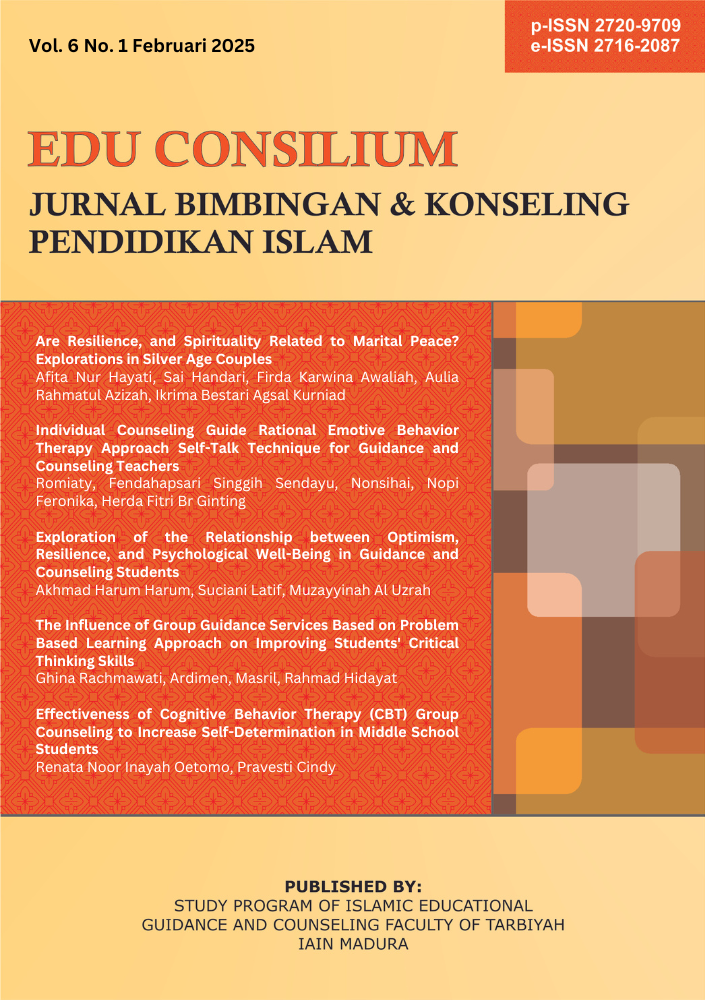Are Resilience, and Spirituality Related to Marital Peace? Explorations in Silver Age Couples
 Abstract views: 135
,
Abstract views: 135
,
 PDF downloads: 119
PDF downloads: 119
Abstract
This study aimed to determine the relationship between resilience and spirituality with marital peace in couples of silver or twenty-five years of marriage age in East Kalimantan. The approach in this study uses quantitative-qualitative methods with regression and narrative data analysis methods. Respondents in this study were married couples who were in the Qaryah Tayyibah community totaling 31 people. The results of the quantitative analysis show that resilience and spirituality can explain and influence marital peace by less than 1%. This means that the other 99% is influenced by different factors. In the F test, the results show that resilience and spirituality do not affect marital peace. The t-test is negative, indicating that the resilience variable does not affect marital peace, as well as the spirituality variable. Results of the narrative analysis of qualitative data from focus group discussions (FGDs) reveal that the resilience variable has a relationship with spirituality but no relationship with the marital peace variable. This study can provide an empirical contribution, namely the support of spirituality variables on marital resilience and effective communication, social support, and emotional intimacy to maintain a healthy relationship despite facing challenges.
Downloads
References
Amobi, F. (2021). Marital Harmony: 25 Ways to Keep Your Marriage Happy and Fulfilling (Marital Harmony Series).
Annur, C. M. (2023). Pertengkaran Terus-Menerus, Faktor Utama Penyebab Perceraian di Indonesia pada 2022. https://databoks.katadata.co.id/datapublish/2023/03/02/pertengkaran-terus-menerus-faktor-utama-penyebab-perceraian-di-indonesia-pada-2022
Aziz, R., & Mangestuti, R. (2021). Membangun Keluarga Harmonis Melalui Cinta dan Spiritualitas pada Pasangan Suami Istri di Provinsi Jawa Timur. Jurnal Ilmu Keluarga Dan Konsumen, 14(2), 129–139. https://doi.org/10.24156/jikk.2021.14.2.129
Barokah, A. L., Marini, D. S., Widuri, E. L., & Hidayati, E. (2023). Pengaruh Program Psikoedukasi “Keluarga Harmonis” terhadap Resiliensi Keluarga. Al-Isyraq: Jurnal Bimbingan, Penyuluhan, Dan Konseling Islam, 6(1), 109–119.
Black, K., & Lobo, M. (2008). A Conceptual Review of Family Resilience Factors. Journal of Family Nursing, 14(1), 33–55. https://doi.org/10.1177/1074840707312237
Creswell, J. W. (2015). Educational research: Planning, conducting, and evaluating quantitative and qualitative research (Fifth edition). Pearson.
Dahlan, S. (2021). Aktualisasi Penafsiran Mitsaqan Ghalizha Sebagai Konsep Pernikahan Perspektif Al-Qur’an (Studi Analisis Tafsir At Thabari dan Al Maraghi) [Tesis, Pascasarjana Institut Ilmu Al-Qur’an (IIQ) Jakarta]. http://repository.iiq.ac.id//handle/123456789/1253
Davidson, D. Z. (2012). “Happy” Marriages in Early Nineteenth-Century France. Journal of Family History, 37(1), 23–35. https://doi.org/10.1177/0363199011428123
Dey, N. E. Y., Amponsah, B., & Wiafe-Akenteng, C. B. (2021). Spirituality and subjective well-being of Ghanaian parents of children with special needs: The mediating role of resilience. Journal of Health Psychology, 26(9), 1377–1388. https://doi.org/10.1177/1359105319873956
Divorce.com staff. (2023). Divorce Rate in the World. https://divorce.com/blog/divorce-rates-in-the-world/#:~:text=Per%20the%20UN%20Yearbook%2C%20the,last%20year%20was%20about%201.6.
Fakhriyani, D. V., Sa'idah, I., Kutsiyah, K., & Aliyullah, M. (2024). Dinamika Psikologis Perempuan Madura dalam Pernikahan Pèghâ’Kaoghân. Alifba Media: Pamekasan.
Ghazaly, A. (2010). Langkah Menuju Keluarga Yang Harmonis. Gramedia Pustaka Utama.
Grygorenko, Z., & Naydonova, G. (2023). The Concept of “Resilience”: History of Formation and Approaches to Definition. PUBLIC ADMINISTRATION AND LAW REVIEW, 2, 76–88. https://doi.org/10.36690/2674-5216-2023-2-76-88
Handari, S., & Nurihsan, A. J. (2024). Etnokonseling Perkawinan. Bening Media Publishing.
Handari, S., & Riyanto, A. (2023). Peace Education in the Context of Marriage: An Ethnographic Study of Couples.
Hart, M. H. (2001). The 100: A ranking of the most influential persons in history (Rev. and updated). Citadel Press/Kensington Pub.
Herfinanda, R., Puspitasari, A., Rahmadian, L., & Kaloeti, V. S. (2021). Family Resilience during the COVID-19 Pandemic: A Systematic Literature Study Resiliensi Keluarga selama Pandemi COVID-19: Studi Literatur Sistematik. Proceding of Inter-Islamic University Conference on Psychology, 1(1). https://doi.org/10.21070/iiucp.v1i1.625
Jakob, B. (with Weyel, B.). (2020). Spirituality, Mental Health, and Social Support: A Community Approach (1st ed). Walter de Gruyter GmbH.
Jannah, M., Kamsani, S. R., & Mohd. Ariffin, N. (2021). Perkembangan Usia Dewasa: Tugas dan Hambatan pada Korban Konflik Pasca Damai. Bunayya : Jurnal Pendidikan Anak, 7(2), 114. https://doi.org/10.22373/bunayya.v7i2.10430
Jayani, D. H. (2020). Ramai RUU Ketahanan Keluarga, Berapa Angka Perceraian di Indonesia? Databooks. https://databoks.katadata.co.id/datapublish/2020/02/20/ramai-ruu-ketahanan-keluarga-berapa-angka-perceraian-di-indonesia
Lestari, Y., Hartati, S., & Nopianti, H. (2019). Pemenuhan Kebutuhan Hidup Rumah Tangga Petani Miskin (Studi Kasus pada Petani Penggarap di Dusun II Talang Watas Desa Muara Langkap Kecamatan Bermani Ilir, Kabupaten Kepahiang). Jurnal Sosiologi Nusantara, 2(2), 94–103. https://doi.org/10.33369/jsn.2.2.94-103
Li, T., & Fung, H. H. (2011). The Dynamic Goal Theory of Marital Satisfaction. Review of General Psychology, 15(3), 246–254. https://doi.org/10.1037/a0024694
Mazid, S. (2023). Strategi Janda Cerai Dalam Pemenuhan Kebutuhan Ekonomi Keluarga di Kota Magelang. Resolusi: Jurnal Sosial Politik, 6(1), 16–26. https://doi.org/10.32699/resolusi.v6i1.3943
Mu’arofah, L. (2023). Pemenuhan Kebutuhan Isteri Dalam Berhias Diluar Rumah. SAKINA: Journal of Family Studies, 7(4), 475–490.
Munawaroh, E., & Mashudi, E. A. (2018). Resiliensi; Kemampuan Bertahan dalam Tekanan, dan Bangkit dari Keterpurukan. CV. Pilar Nusantara. https://books.google.co.id/books?id=vYImEAAAQBAJ
Munawaroh, E., Sugiharto, D. Y. P., Sofyan, A., Arinata, F. S., Asti, Z. P. B., & Mashudi, E. A. (2021). Family Resilience Belief System: A Phenomenological Study on Javanese and Sundanese Family. Jurnal Kajian Bimbingan Dan Konseling, 6(2), 80–89.
Musthofa, K., & Subiono, S. (2020). Spirit Mitsaqan Ghalidza dalam Pernikahan sebagai Penguatan Keluarga di Kalimantan Tengah. LEGITIMA: Jurnal Hukum Keluarga Islam, 2(2). https://doi.org/10.33367/legitima.v2i2.1199
Nia, L., & Loisa, R. (2019). Pengaruh Penggunaan New Media Terhadap Pemenuhan Kebutuhan (Studi Tentang Media Sosial Facebook Dalam Pemenuhan Informasi di Kalangan Ibu Rumah Tangga). Prologia, 3(2), 489. https://doi.org/10.24912/pr.v3i2.6393
Nurlatifah, A. I., & Handari, S. (2024). Mencapai Kedamaian Perkawinan sebagai Representasi Keberhasilan Dakwah dalam Keluarga. 2(1).
Roscoe, J. T. (1975). Fundamental research statistics for the behavioral sciences (2d ed). Holt, Rinehart and Winston.
Sari, D. P. (2021). Telaah Kritis Marital Satisfaction dalam Perspektif al Quran dan Psikologi Positif. AL QUDS : Jurnal Studi Alquran dan Hadis, 5(2), 693. https://doi.org/10.29240/alquds.v5i2.2703
Sari, I. P., Ifdil, I., & Yendi, F. M. (2019). Resiliensi Pada Single Mother Setelah Kematian Pasangan Hidup. SCHOULID: Indonesian Journal of School Counseling, 4(3), 78. https://doi.org/10.23916/08411011
Shi, C. G. (2009). Quest for harmony: The Moso traditions of sexual union and family life. Stanford University press.
Shoshana, G. (2017). On the Economics of Marriage—A Theory of Marriage, Labor and Divorce (Second). Springer Publishing Company.
Smith, R. B., & Stephens, K. G. (1976). The Happy Marriage of Administration and Research. Community College Review, 3(3), 26–29. https://doi.org/10.1177/009155217600300305
Swinton, J. (2001). Spirituality and mental health care: Rediscovering a “forgotten” dimension. J. Kingsley Publishers.
Walsh, F. (2015). Strengthening Family Resilience. Guilford Press.
Wilkinson, B. (2019). Prayers of blessing over my marriage. Harvest House Publishers.
Williams, C. (2014). The Happy Marriage of Capitalism and Feminism. Contemporary Sociology: A Journal of Reviews, 43(1), 58–61. https://doi.org/10.1177/0094306113514538c
Zaheri, F., Dolatian, M., Shariati, M., Simbar, M., Ebadi, A., & Hasanpoor Azghadi, S. B. (2016). Effective Factors in Marital Satisfaction in Perspective of Iranian Women and Men: A systematic review. Electronic Physician, 8(12), 3369–3377. https://doi.org/10.19082/3369
The journal operates an Open Access policy under a Creative Commons Non-Commercial 4.0 International license. Authors who publish with this journal agree to the following terms:
- Authors retain copyright and grant the journal right of first publication with the work simultaneously licensed under a
 Commons Attribution-NonCommercial 4.0 International License
Commons Attribution-NonCommercial 4.0 International Licensethat allows others to share — copy and redistribute the material in any medium or format, and adapt — remix, transform, and build upon the material.
- Authors are able to enter into separate, additional contractual arrangements for the non-exclusive distribution of the journal's published version of the work (e.g., post it to an institutional repository or publish it in a book), with an acknowledgement of its initial publication in this journal.
- Authors are permitted and encouraged to post their work online (e.g., in institutional repositories or on their website) prior to and during the submission process, as it can lead to productive exchanges, as well as earlier and greater citation of published work (see The Effect of Open Access).




















